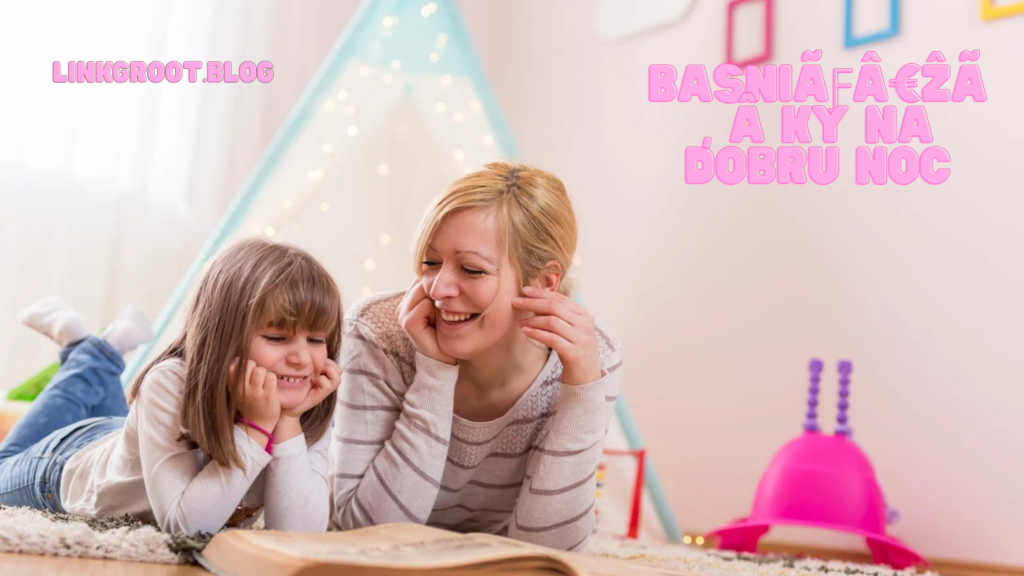Introduction
In the tapestry of global languages, specific phrases possess an inexplicable allure, captivating the imagination and echoing the cultural richness of a region. One such enigmatic phrase is “Basniãƒâ€žã‚â Ky Na Dobru Noc,” a lyrical expression hailing from the heart of the Czech language. In this investigation, we will unwind the layers of this enamoring expression, digging into its semantic roots, social importance, and the feelings it summons.
Linguistic Intricacies of “Basniãƒâ€žã‚â Ky Na Dobru Noc”
To truly appreciate the essence of “Basniãƒâ€žã‚â Ky Na Dobru Noc,” we must embark on a linguistic journey through the Czech language. The expression means “Recount to me a story for a decent evening,” uncovering an idyllic combination of words that epitomizes the Czech propensity for narrating and the glow of wishing somebody a quiet night’s rest. Each phrase element contributes to its melodic quality, reflecting the linguistic artistry inherent in Czech expression.
Cultural Significance and Storytelling Traditions
Emotional Resonance: Nurturing Connections through Words
Beyond its linguistic and cultural dimensions, “Basniãƒâ€žã ‚â Ky Na Dobru Noc” carries a profound emotional resonance. The demonstration of requesting a story for a decent night is a personal signal, representing the longing for association, solace, and a feeling that everything is good. It indicates the immortal human requirement for stories that calm the spirit and transport the brain to the domains of a creative mind, even as the night unfurls.
The Art of Storytelling in Czech Tradition
Czech narrating is a work of art that goes past simple diversion. It saves history, gives insight, and encourages a profound feeling of the local area. From the legendary stories of legendary animals to the genuine accounts of daily existence, Czech narration encompasses various subjects, each adding to the rich embroidery of the country’s social legacy.
“Basniãƒâ€žã‚â Ky Na Dobru Noc” in Modern Context
In the contemporary context, the phrase “Basniãƒâ€žã ‚â Ky Na Dobru Noc” continues to echo through Czech households, albeit with a modern twist. With the innovative approach, narrating has taken on new structures, from reading sleep time stories on computerized gadgets to sharing virtual accounts across borders. The expression stays a scaffold among custom and development, a demonstration of perseverance through the force of words to make the association and encourage a feeling of having a place.
Conclusion:
The phrase “Basniãƒâ€žã‚â Ky Na Dobru Noc” transcends its literal translation, embodying the spirit of Czech storytelling and the warmth of sincere wishes for a peaceful night. Its phonetic magnificence, social importance, and close-to-home reverberation demonstrate the perseverance through the charm of language. As we investigate the profundities of this expression, we uncover words and a passage to the spirit of a culture. This culture cherishes the art of storytelling as a timeless expression of human connection and shared experiences.
FAQs:
What does “Basniãƒâ€žã‚â Ky Na Dobru Noc” mean?
“Basniãƒâ€žã‚â Ky Na Dobru Noc” is a Czech phrase that translates to “Tell me a story for a good night.” A cultural inclination towards storytelling often guides its use as a warm and intimate request for a bedtime story.
Is “Basniãƒâ€žã ‚â Ky Na Dobru Noc” commonly used in everyday conversation?
Yes, the phrase is a part of the Czech vernacular and is commonly used, especially in familial settings. It signifies a desire for a narrative before bedtime, emphasizing the cultural importance of storytelling in Czech tradition.
What is the cultural significance of “Basniãƒâ€žã‚â Ky Na Dobru Noc”?
The phrase holds cultural significance as it embodies the Czech tradition of storytelling. It reflects the importance of passing down wisdom, preserving cultural heritage, and fostering connections through narrative art.
Can “Basniãƒâ€žã‚â Ky Na Dobru Noc” be used in a modern context?
Absolutely. While rooted in tradition, the phrase has adapted to the modern era. In contemporary times, people may use it to request traditional bedtime stories and express a desire for engaging narratives, including digital or virtual storytelling experiences.
Does the phrase have variations in different regions of the Czech Republic?
While the core meaning remains consistent, variations may exist in local dialects or regional accents. The people of the Czech Republic universally understand the sentiment of desiring a bedtime story for a good night.
How has technology influenced the use of “Basniãƒâ€žã ‚â Ky Na Dobru Noc”?
Technology has modernized the practice of storytelling associated with the phrase. People can digitally share stories today, fostering connections across distances. The essence of “Basniãƒâ€žãâ Ky Na Dobru Noc” remains intact, bridging tradition and innovation.
Can “Basniãƒâ€žã‚â Ky Na Dobru Noc” be used in non-Czech cultures?
While the phrase is specific to Czech, its sentiment is universal. The idea of requesting a story for a good night is relatable across cultures. Making it a charming expression that transcends linguistic boundaries.
Read also:


